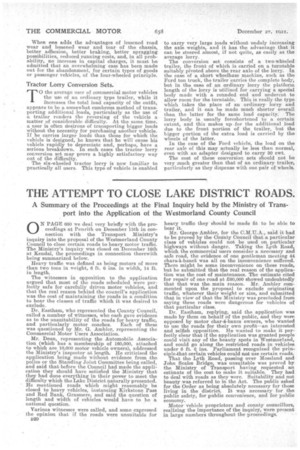THE ATTEMPT TO CLOSE LAKE DISTRICT ROADS.
Page 2

If you've noticed an error in this article please click here to report it so we can fix it.
A Summary of the Proceedings at the Final Inquiry held by the Ministry of Transport into the Application of the Westmorland County Council 0 N PAGE 660 we deal very briefly with the proceedings at Penrith on December 15th in connection with the Transport Ministry's inquiry into the proposal of the Westmorland County Council to close certain roads to heavy motor traffic. The Ministry's inquiry was closed on December 16th at Kendal, the proceedings in connection therewith being summarized below.
Heavy traffic was defined as being motors of more than two tons in weight, 6 ft. 6 ins, in width, 14 ft. in length.
The witnesses in opposition to the application argued that most of the roads scheduled were perfectly safe for carefully driven motor vehicles, and that the real reason behind the council's application was the cost of maintaining the roads in a condition to bear the classes of traffic which it was desired to exclude.
Dr. Ea,stham, who represented the County Council, called a number of witnesses, who each gave evidence as to the unsuitability of the roads for heavy traffic, and particularly motor coaches. Each of these was questioned by Mr. G. Ambler, representing the Commercial Motor Users Association.
Mr. Dean, representing the Automobile Association (which has a membership of 160,000, attached to which are 10,000 motor vehicle owners), addressed the Ministry's inspector at length. He criticised the application being made without evidence from the police or the Standing joint Committee being called, and said that before the Council had made the application they should have satisfied the Ministry that they had done everything in their power to meet the difficulty which the Lake District naturally presented. He mentioned roads which might reasonably be closed to heavy vehicles, instancing Kirkstone Pass and Red Bank, Grasmere, and said the question of length and width of vehicles would have to be a national question.
Various witnesses were called, and some expressed the opinion that if the roads were unsuitable for R.20 heavy traffic they should he made fit to be able to bear it.
Mr. George Ambler' for the C.M.U.A., said it had to be proved by the County Council that a particular class of vehicles could not be used on particular highways without danger. Taking the Lyth Road, which the commercial users consider a necessary and safe road, the evidence of one gentleman meeting 44 ehars-hebana was all on the inconvenience suffered. There might be some inconvenience on these roads, but he submitted that the real reason of the application was the cost of maintenance. The estimate cited for repair of one road at 260,000 showed undoubtedly that that was the main reason. Mr. Ambler commented upon the proposal to exclude originating traffic, whatever their weight or size, and submitted that in view of that the Ministry was precluded from saying these roads were dangerous for vehicles of that particular class.
Dr. Eastham, replying, said the application was made by them on behalf of the public, and they were opposed by motor char-a-bancs owners, who wanted to use the roads for their own profit—an interested and selfish opposition. He wanted to make it perfectly clear that if the application was granted people could visit any of the beauty spots in Westmorland, and could go along the restricted roads in vehicles under 6 ft. 6 ins. Parliament recognized the principIe-that certain vehicles could not use certain roads_ That the Lyth Road, passing over Mossland and John Scales Bridge, was unsuitable was proved by the Ministry of Transport having requested an estimate of the cost to make it suitable. They had to deal with roads as they were. Suitability and not beauty was referred to in the Act. The public asked for the Order as being absolutely necessary for those living in the district. It was necessary for the public safety, for public convenience, and for public economy. Motor vehicle proprietors and county councillors, realizing the importance of the inquiry, were present in large numbers throughout the proceedings.
































